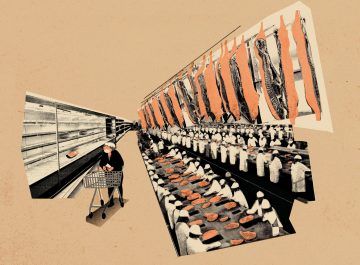Michael Pollan in the New York Review of Books:
 “Only when the tide goes out,” Warren Buffett observed, “do you discover who’s been swimming naked.” For our society, the Covid-19 pandemic represents an ebb tide of historic proportions, one that is laying bare vulnerabilities and inequities that in normal times have gone undiscovered. Nowhere is this more evident than in the American food system. A series of shocks has exposed weak links in our food chain that threaten to leave grocery shelves as patchy and unpredictable as those in the former Soviet bloc. The very system that made possible the bounty of the American supermarket—its vaunted efficiency and ability to “pile it high and sell it cheap”—suddenly seems questionable, if not misguided. But the problems the novel coronavirus has revealed are not limited to the way we produce and distribute food. They also show up on our plates, since the diet on offer at the end of the industrial food chain is linked to precisely the types of chronic disease that render us more vulnerable to Covid-19.
“Only when the tide goes out,” Warren Buffett observed, “do you discover who’s been swimming naked.” For our society, the Covid-19 pandemic represents an ebb tide of historic proportions, one that is laying bare vulnerabilities and inequities that in normal times have gone undiscovered. Nowhere is this more evident than in the American food system. A series of shocks has exposed weak links in our food chain that threaten to leave grocery shelves as patchy and unpredictable as those in the former Soviet bloc. The very system that made possible the bounty of the American supermarket—its vaunted efficiency and ability to “pile it high and sell it cheap”—suddenly seems questionable, if not misguided. But the problems the novel coronavirus has revealed are not limited to the way we produce and distribute food. They also show up on our plates, since the diet on offer at the end of the industrial food chain is linked to precisely the types of chronic disease that render us more vulnerable to Covid-19.
The juxtaposition of images in the news of farmers destroying crops and dumping milk with empty supermarket shelves or hungry Americans lining up for hours at food banks tells a story of economic efficiency gone mad. Today the US actually has two separate food chains, each supplying roughly half of the market. The retail food chain links one set of farmers to grocery stores, and a second chain links a different set of farmers to institutional purchasers of food, such as restaurants, schools, and corporate offices. With the shutting down of much of the economy, as Americans stay home, this second food chain has essentially collapsed. But because of the way the industry has developed over the past several decades, it’s virtually impossible to reroute food normally sold in bulk to institutions to the retail outlets now clamoring for it. There’s still plenty of food coming from American farms, but no easy way to get it where it’s needed.
More here.
